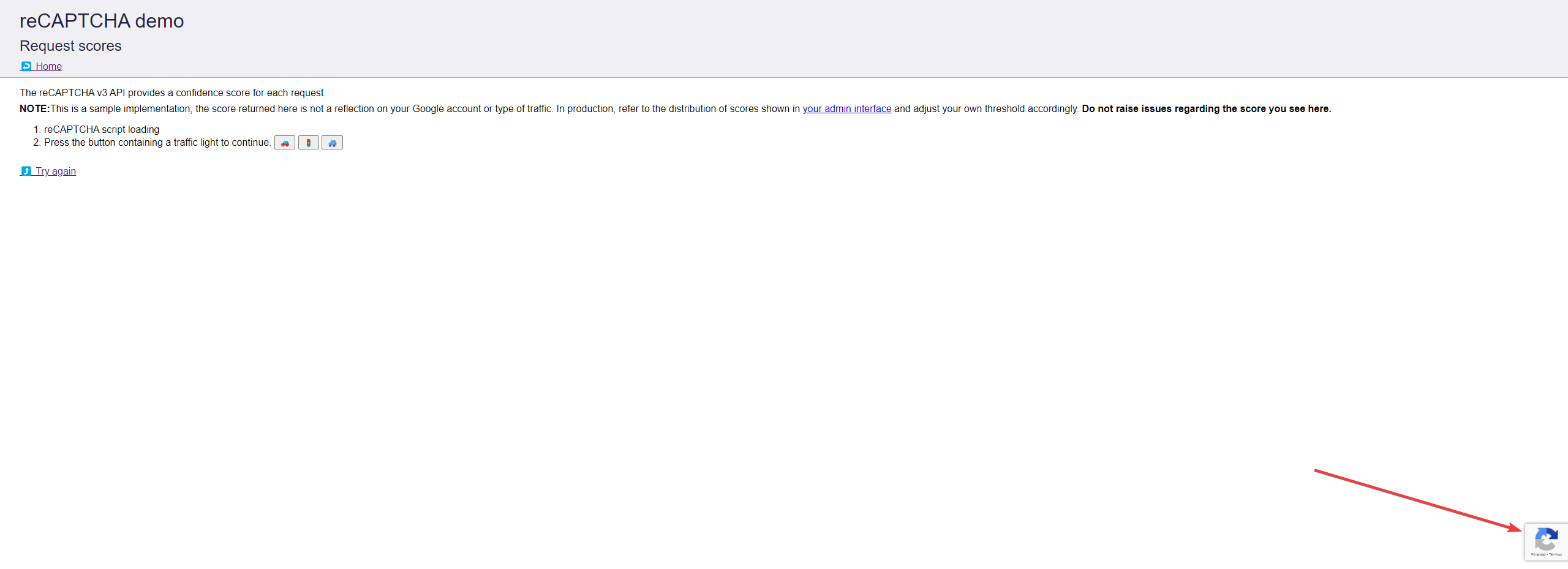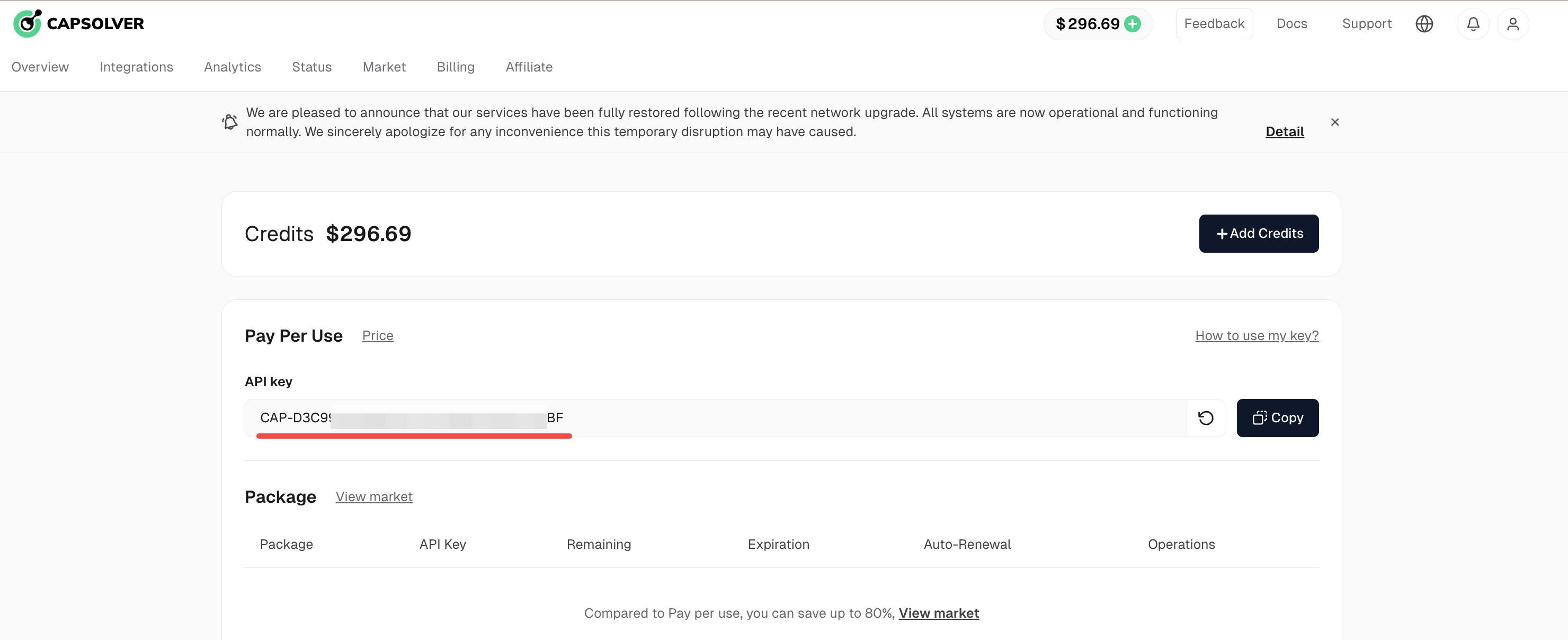When I first encountered reCAPTCHA Enterprise in my web scraping projects, I quickly realized how challenging it could be. Navigating these advanced security measures was no easy feat, but through trial and error, I developed strategies that have made all the difference. In this guide, I’ll share my approach to overcoming reCAPTCHA Enterprise challenges, ensuring that your scraping tasks can proceed without a hitch. Let me walk you through the techniques that have worked best for me.
reCAPTCHA Enterprise is a sophisticated service from Google designed to protect websites from fraud and scraping activities. It employs an adaptive risk engine to evaluate user interactions and prevent unauthorized access.
reCAPTCHA v3 Enterprise looks like:
Struggling with the repeated failure to completely solve the irritating captcha?
Discover seamless automatic captcha solving with Capsolver AI-powered Auto Web Unblock technology!
Claim Your Bonus Code for top captcha solutions; CapSolver: WEBS. After redeeming it, you will get an extra 5% bonus after each recharge, Unlimited
In my interactions with reCAPTCHA Enterprise, I've observed that it analyzes various metrics such as the user’s platform, browser environment, and navigation behavior. This analysis produces a bot score ranging from 0 to 1. Scores near 0 indicate high-risk activities, while those closer to 1 suggest legitimate user behavior.
reCAPTCHA Enterprise uses a scoring system to detect bot-like activities. It filters requests by allowing low-risk scores to proceed while blocking high-risk ones. This ensures that only genuine users gain access, while automated scripts and web scrapers are effectively prevented from accessing the site.
From what I've seen, reCAPTCHA Enterprise does not rely on traditional CAPTCHAs like visual puzzles. Instead, it responds to high-risk scores with various protective measures. These can include displaying physical CAPTCHAs, banning IP addresses, requesting two-factor authentication, or redirecting to honeypots. Automated scripts that don’t achieve the required bot score are blocked before they can reach the target data. Certainly! Here’s a revised version of the paragraph:
One distinctive feature of reCAPTCHA v3 Enterprise is its unique script named enterprise.js. Websites using reCAPTCHA v3 Enterprise need to include this specific script for proper functionality, making its presence a strong indicator of the service being employed.
You can locate the enterprise.js script within the website's source code, usually embedded in a <script> HTML tag. The src attribute in this tag will direct you to the JavaScript file’s location. For reCAPTCHA v3 Enterprise, the script will be found at one of these URLs:
https://recaptcha.net/recaptcha/enterprise.js
https://google.com/recaptcha/enterprise.js
In the website's HTML, the script tag will look like this:
<script src="https://recaptcha.net/recaptcha/enterprise.js" async defer></script>or
<script src="https://google.com/recaptcha/enterprise.js" async defer></script>The async and defer attributes ensure that the script loads asynchronously and doesn’t hinder the webpage’s loading speed and performance.
So in my web scraping projects, I've found CapSolver to be an incredibly effective tool for overcoming the challenges posed by reCAPTCHA Enterprise, especially when dealing with reCAPTCHA v3 Enterprise. Here's my approach to using CapSolver to solve reCAPTCHA v3 Enterprise:
Before diving into the implementation, make sure you have the following:
- Python installed on your system
- A CapSolver API key (obtainable from the CapSolver Dashboard
- A proxy (optional, but recommended for better results)
First, I always ensure that I have the necessary packages installed. The primary package we need is capsolver. You can install it using pip:
pip install capsolver
Now, let's look at how to implement CapSolver to solve reCAPTCHA v3 Enterprise challenges. I'll provide two versions of the code: one using a proxy and another without.
Here's the Python script I use when I want to solve reCAPTCHA v3 Enterprise with a proxy:
import capsolver
from urllib.parse import urlparse
# Configuration
PROXY = "http://username:password@ip:port"
capsolver.api_key = "YourApiKey"
PAGE_URL = ""
PAGE_KEY = ""
PAGE_ACTION = ""
def solve_recaptcha_v3_enterprise(url, key, pageAction):
solution = capsolver.solve({
"type": "ReCaptchaV3EnterpriseTask",
"websiteURL": url,
"websiteKey": key,
"pageAction": pageAction,
"proxy": PROXY
})
return solution
def main():
print("Solving reCaptcha v3 Enterprise")
solution = solve_recaptcha_v3_enterprise(PAGE_URL, PAGE_KEY, PAGE_ACTION)
print("Solution:", solution)
token = solution["gRecaptchaResponse"]
print("Token Solution:", token)
if __name__ == "__main__":
main()For scenarios where I don't need or want to use a proxy, I use this slightly modified version:
import capsolver
from urllib.parse import urlparse
# Configuration
capsolver.api_key = "YourApiKey"
PAGE_URL = ""
PAGE_KEY = ""
PAGE_ACTION = ""
def solve_recaptcha_v3_enterprise(url, key, pageAction):
solution = capsolver.solve({
"type": "ReCaptchaV3EnterpriseTaskProxyless",
"websiteURL": url,
"websiteKey": key,
"pageAction": pageAction
})
return solution
def main():
print("Solving reCaptcha v3 Enterprise")
solution = solve_recaptcha_v3_enterprise(PAGE_URL, PAGE_KEY, PAGE_ACTION)
print("Solution:", solution)
token = solution["gRecaptchaResponse"]
print("Token Solution:", token)
if __name__ == "__main__":
main()When using these scripts, I always make sure to update the following variables:
PROXY: If using the proxy version, I update this with my proxy details in the formathttp://username:password@ip:port.capsolver.api_key: I insert my CapSolver API key here.PAGE_URL: I set this to the URL of the website where I'm solving the reCAPTCHA.PAGE_KEY: I update this with the specific reCAPTCHA site key.PAGE_ACTION: I set this to the pageAction of the reCAPTCHA challenge.
To find the correct values for PAGE_KEY and PAGE_ACTION, I often refer to Capsolver's blog post on identifying reCAPTCHA v3 values.
This method has proven highly effective in my scraping projects for several reasons:
- High Success Rate: CapSolver consistently provides valid tokens that successfully solve reCAPTCHA v3 Enterprise challenges.
- Flexibility: The ability to use proxies allows me to distribute requests and reduce the risk of being blocked.
- Simplicity: The straightforward API makes integration into existing scripts easy.
- Speed: Solutions are typically delivered within seconds, maintaining the efficiency of my scraping operations.
If you're also dealing with reCAPTCHA v2 Enterprise challenges, you might find the following blog post helpful. It provides insights and strategies for solving reCAPTCHA v2 Enterprise, which can be useful for tackling similar CAPTCHA systems:
How to Solve reCAPTCHA v2 Enterprise
Navigating reCAPTCHA Enterprise, particularly reCAPTCHA v3 Enterprise, can be a daunting task in the realm of web scraping. However, by leveraging advanced solutions like CapSolver, you can significantly simplify this process.
From my experience, integrating CapSolver into your scraping workflow not only enhances efficiency but also ensures higher success rates in solving these sophisticated security measures. Whether you choose to use proxies or opt for a direct approach, CapSolver provides the tools and flexibility needed to handle reCAPTCHA challenges effectively.
Remember, while CapSolver is a powerful ally, maintaining best practices in web scraping and ensuring compliance with legal standards is crucial. By combining effective tools with ethical practices, you can achieve your scraping goals without compromising on integrity.
For more information on CapSolver and to get started with overcoming CAPTCHA challenges, visit CapSolver’s website.



